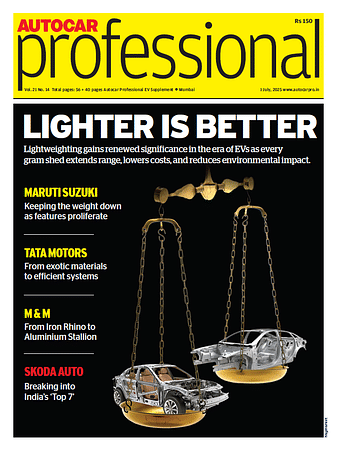Steelbird International sets ambitious Rs 1,000 crore revenue target by 2030
Steelbird’s aftermarket-focused strategy aims to capitalize on the Rs 74,000 crore sector and drive fivefold growth.
Steelbird International, a leading automotive components manufacturer, has announced plans to achieve a fivefold revenue growth to Rs 1,000 crore by 2030, primarily through expansion in the aftermarket segment. The company's executive director Manav Kapur said the aftermarket sector, which currently contributes 70% of their revenue, will be central to this growth strategy.
The company has begun diversifying its trading portfolio to include automotive products such as tyres, lubricants, and spark plugs sourced from China, leveraging its brand presence without significant capital investment. To maintain quality standards, Steelbird has established a zonal warehousing network across its operations.
Operating in 14 countries with over 5,000 dealers, Steelbird has built a portfolio exceeding 2,800 products since its establishment in 1964. The company began its journey by supplying filters to Royal Enfield and has since expanded to serve major automotive manufacturers including Tata Motors, Escorts, and Bosch.
In response to the growing electric vehicle market, Steelbird has formed a partnership with Chinese sensor manufacturer Winsen to bring sensor technology to India. The collaboration initially focuses on technology transfer, with plans to establish local manufacturing facilities in alignment with India's self-reliance initiatives.
The company has also entered into a partnership with Israel's AL Group to introduce app-controlled in-car fragrance technology, targeting the ride-sharing market. The collaboration includes plans for local manufacturing of these systems in India using existing Steelbird facilities.
The Indian auto components industry has shown steady growth in recent years, with the Automotive Component Manufacturers Association of India (ACMA) reporting that the aftermarket segment alone is valued at over Rs 74,000 crore. This sector has been driven by increasing vehicle population, rising average vehicle age, and growing consumer preference for authorized service centers.
RELATED ARTICLES
MediaTek Sees India Account for 20% of Global Automotive Chip Rollout in 5 Years
Taiwanese semiconductor firm bets big on India's connected vehicle ecosystem, ramps up local engineering efforts and EV ...
MG Says Not Immune to Rare Earth Disruption
Managing Director says Chinese connection with SAIC Motor provides no preferential access to critical materials needed f...
Gabriel India to Invest Rs 27 Crore in Fasteners Joint Venture with South Korean Firm
Company will hold 51% stake in Jinhap Automotive India Private Limited to manufacture automotive and industrial fastener...





 18 Jan 2025
18 Jan 2025
 90473 Views
90473 Views





 Darshan Nakhwa
Darshan Nakhwa


 Prerna Lidhoo
Prerna Lidhoo

 Shruti Shiraguppi
Shruti Shiraguppi

